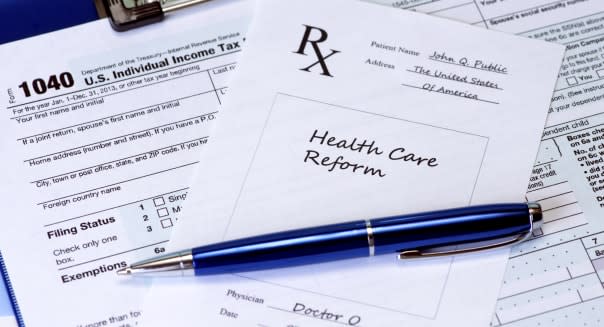Can You Really Ignore the Obamacare Penalty?

The Patient Protection and Affordable Care Act, better known as Obamacare, has been controversial ever since it was first proposed. One of the most contentious issues over Obamacare is the individual mandate, which requires Americans to have qualifying health insurance coverage to avoid owing a penalty.
Yet some have asserted that taxpayers don't have to worry about Obamacare penalties because of limitations in the law that created it, and even the IRS has noted that it doesn't have as much recourse to collect unpaid penalty amounts as it does for traditional income tax collections. Let's take a closer look at the Obamacare penalty provisions with an eye toward figuring out the truth about whether you have to pay a penalty or not.
When You Might Have to Pay Obamacare Penalties
Penalties under Obamacare, which the law refers to as "shared responsibility payments," kick in if you don't have the required minimum essential coverage and don't qualify for an exemption. Exemptions are available in 2015 for those for whom the cost of health insurance would be more than 8.05 percent of their household income, as well as those who are homeless, have had their homes foreclosed upon, have filed for bankruptcy, have substantial unpaid medical bills, or have suffered the death of a close family member. A few other exemptions apply, including victims of domestic violence, those who've gone through a natural disaster, and those who are caring for eligible family members and have had to pay higher costs as a result.
If you don't have coverage and an exemption doesn't apply, then the base penalty for 2015 is $325 an adult and $162.50 a child up to a family maximum of $975. However, if your income is high enough so that 2 percent of the amount of income above the tax filing threshold is greater than the base penalty, then you'll owe the higher amount.
Why Some Say You Don't Have to Pay
One of the strangest elements of the Affordable Care Act is that after going to all the trouble of creating penalties for not having adequate health care coverage, the law does almost nothing to give the IRS any power to enforce the penalty provisions. Specifically, the law forbids the IRS from using its typical collection actions, including filing a notice of a tax lien. Ordinarily, that would allow the IRS to attach a lien to items including bank accounts, personal assets, or even your wage income. Moreover, the IRS isn't allowed to impose any other penalties related to unpaid taxes or to begin criminal prosecution proceedings for failure to pay the penalty voluntarily. Obamacare - 2015 Total On Exchange Enrollment HealthGrove Indeed, the only way the IRS can collect the Obamacare penalty is by deducting it from the refund you'd otherwise be due. If you don't havea refund coming to you, then the penalty amount simply carries forward to future years, presumably accumulating interest but otherwise being practically unenforceable.
Still, the problem is that if you ever are in a position where you'd be owed a tax refund, the IRS will jump at the chance to collect back Obamacare penalties from your refund check. There's no guarantee that lawmakers won't change those provisions in the future and allow collection of back taxes owed, but for now, IRS power to enforce penalties is quite limited.
For those who categorically oppose Obamacare and its individual mandate provisions, the better course of action is to apply for an open-ended hardship exemption based on the "any other hardship" provisions of the statute. Even if none of the listed exemptions applies to your situation, the ability to make your case could get you out of penalties entirely -- and never have to worry about whether the IRS might be able to enforce a penalty later. Given how much Obamacare penalties have grown since last year and are projected to rise even further next year, taking steps to get an exemption is far safer than rolling the dice with the IRS and hoping that you'll never get a refund that the IRS would simply take away from you.
Motley Fool contributor Dan Caplinger is fortunate enough to have health care coverage. You can follow him on Twitter @DanCaplinger or on Google Plus. Check out our free report on one great stock to buy for 2015 and beyond.

